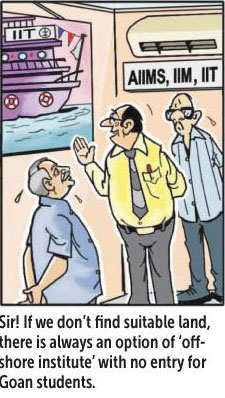18 Oct 2017 | 04:51am IST
Enough. Please don’t drag the critically ailing Vishnu Wagh to the police station and courts
When the Goa Konkani Academy decided to cancel all the 32 undeclared awards for works of literature, art, etc for the last two years, the catalyst for this decision was widely believed to be the need to prevent the award from being declared for politician, poet and literary figure Vishnu Surya Wagh’s collection of poems Sudhir Sukta.
While the move on one hand evoked criticism among certain quarters and on the other a vindication of the need to prevent books which castigate certain communities and use vulgar language from getting literary salutation, these differences remained in the confines of debate and intellectual and social argument.
The forces on both sides of the argument have the right to continue to cheer or castigate Wagh and his work. However, when an FIR is filed against him and his publisher by Bailancho Ekvott, it queers the pitch and makes it ugly and unfair. The charges are prima facie serious (292 ,293, 295 of IPC for obscene, derogatory remarks in poem there by outraging modesty of women and also section 4 of indecent Representation of Women( Prohibition) Act 1986).
In Goa, including the complainant is aware of Vishnu Wagh’s health condition and his inability to respond, react and take this complaint head on. A heart attack and other complications have kept Wagh bedridden for over a year now and it is he alone, and not any lawyer, who can best answer the charges levelled against him, in reference to chapters and lines in his book.
Even Wagh’s staunchest literary opponents will agree that dragging him to the police and the courts in this condition is an absolute travesty. An appeal in the court to get the passages or chapters, that are offensive to women withdrawn is perfectly justifiable but the manner in which the ailing former MLA has been slapped with a police complaint and case, and that too for a book which was in circulation for three years and run out of print and attracted no case or penalty, in unfair.
It is only when one of the jury members of the Goa Konkani Academy which met to finalise short-listing the book for the Goa Konkani Academy Award, poet Sanjeev Verenkar objected that the controversy erupted. He said it was “laced with vulgarity, slams a particular caste and is derisive of women”. But even he did not question the right of Wagh to have the freedom to write what he wanted in his collection of poems. He only objected to him getting a state award for it. As he told IANS “Poets are free to write what they want and there should be no compulsion on it, but a government agency shouldn't endorse such vulgar, reckless writing,"
Other jury members Nilba Khandekar, Sonali Chodankar fully endorsed Wagh’s collection of poems and were happy to recommend it for the award while publisher Hema Naik, a Sahitya Akademi award-winning author herself, denied that the poems targeted a particular caste, and added that these poems are of exploitation of the backward castes in the hands of the powerful Goud Saraswat Brahmins (GSBs).
However, the point here is that even a cursory reading of some of the poems makes it evident that Wagh has indeed targeted the GSBs in a poem, "Farak" (Difference) where he writes against the GSBs. Here is an excerpt: “They emerge pure/But we continue to be impure/Or else, how could they/Walk into the sanctum sanatorium and touch God?/And we/Can only catch a mere glimpse from the outside/Before getting edged away/There is a difference between them and us”
In the same poem, he has made sexual innuendos, which may affect sensibilities but the thrust of the poem is the writer’s, consistent stand, as a champion of the backward castes, against alienation and what he felt was “exploitation”.
Surely these thoughts have a place in literature and literary expression. Those who oppose this strain of thought have the right to debate, discuss and oppose through the same forum of literary expression.
Is it fair that a piece of literature in the public domain for three years does not get questioned and it is only when it is on the verge of getting an award that the opposition to the work has to move from the literary to the criminal.
At his juncture, it will be simply advisable to step back and exercise some calm. A literary disagreement or even a castigation of any community, as long as it does not spread hatred or communalise society, has to find a place in our literary discourse as much as a counter criticism to Vishnu Wagh’s writings through another work of writing. If lines have been breached and women have been denigrated, this can be argued, perhaps in a literary and cultural forum and an appeal may be made to delete certain references.
Doesn’t our same Indian culture and tradition teach us to treat the seriously ailing with dignity and respect? An FIR in a police station crosses the line of basic decency against a man not capable of defending himself due to his failing faculties even as we pray fervently for the “lion” Vishnu Wagh to return amongst us in the pink of health.
